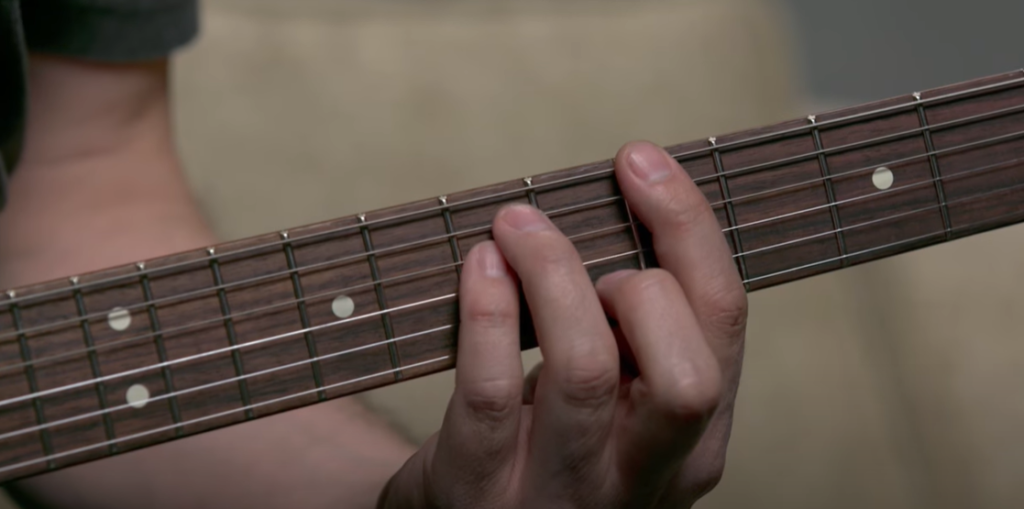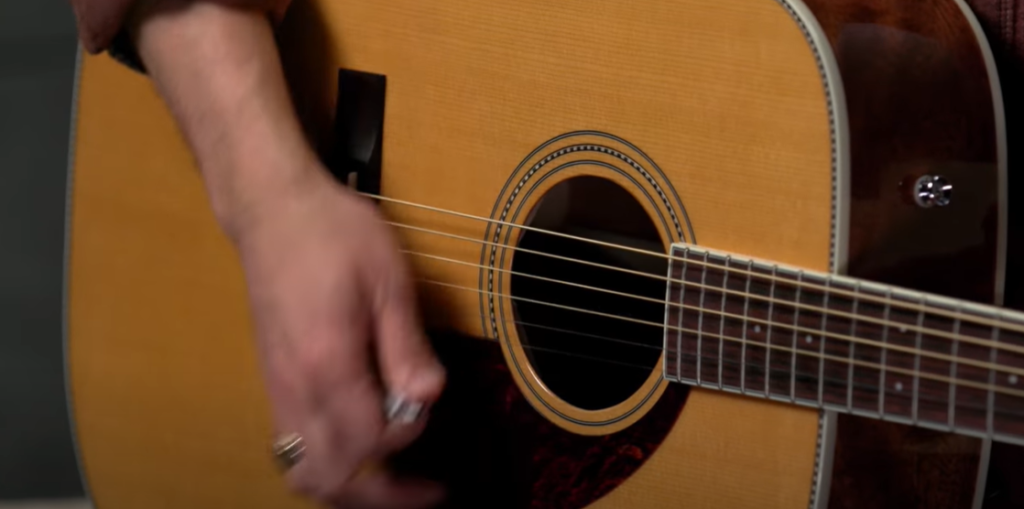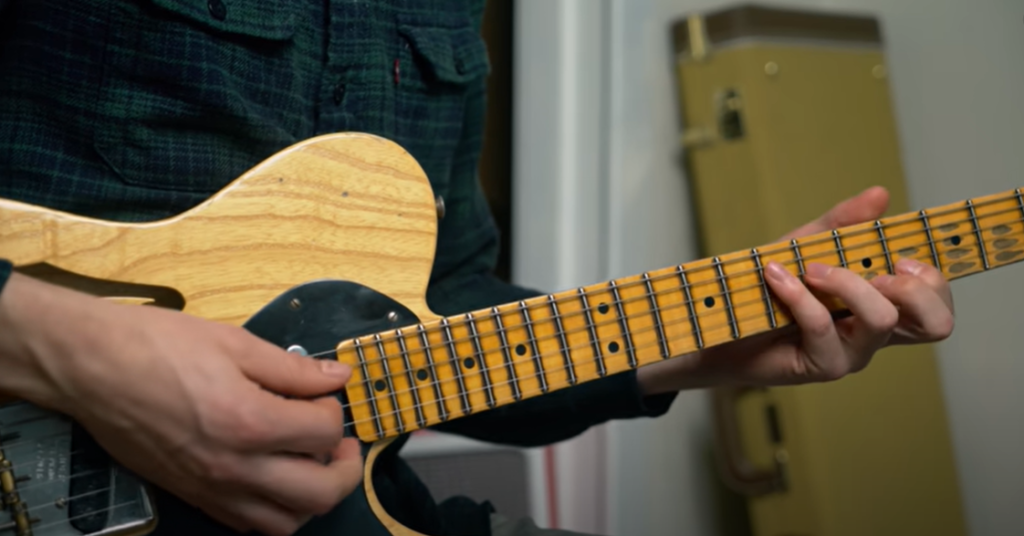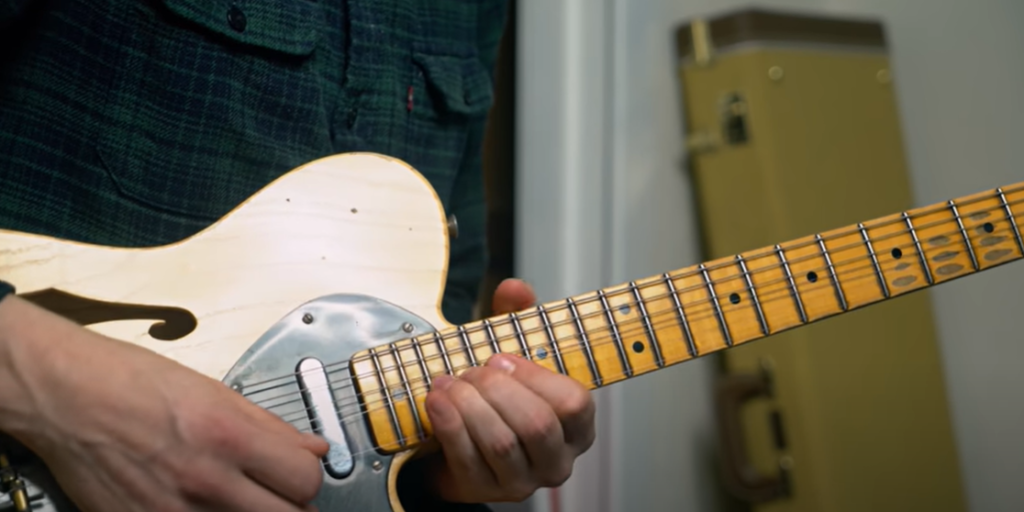Are you looking for a way to reduce stress, improve your mental health and become more creative? Why not consider learning how to play the guitar! Playing guitar is an enjoyable art form that provides numerous benefits. Not only does it exercise your mind and help you relax, but it can also lead to a lifetime of enjoyment playing for leisure or even taking lessons with professional teachers. In this post, we’ll explore why learning how to play the guitar is such an advantageous activity and take a look at some of the positive effects associated with making music. Whether you want to express yourself creatively or just need something fun to do in your free time, delving into guitar-playing could be exactly what you’re looking for – so read on and discover more about these amazing rewards!
Benefits of Playing Guitar
1. Bolster Your Memory and Build Brain Power by Developing Cognitive Skills
Learning to play the guitar requires concentration, memorization, and problem solving. Repeatedly playing songs helps you remember musical notes, rhythms, chords and lyrics more easily. This improved memory can also help with other cognitive functions such as understanding new concepts quickly.

2. Enhances Creativity
Playing the guitar encourages creativity by challenging you to think outside the box when it comes to melody and songwriting. It gives you an outlet for expressing yourself musically, helping you develop a unique style that is all your own.
3. Teaches You Discipline
Learning to play guitar requires a great deal of discipline and dedication. You have to practice regularly in order for you to learn and master the instrument. Discipline, goal-setting, and perseverance – these are all invaluable lessons that can be carried into other areas of your life. This course offers a comprehensive approach to teaching you how to hone those skills and use them in order to reach the pinnacle of success! [1]
4. Develops Social Skills Teamwork
Playing guitar requires you to interact with other people. Not only can it help you practice playing in a group, but also teaches you how to collaborate and work well with others. Additionally, playing shows or events provides an opportunity for networking which can be beneficial if you are looking to move up in the music industry.
5. Improves Your Math Performance
Believe it or not, playing guitar can actually help with math. This is because the instrument involves a lot of counting, tempo-keeping and rhythm reading. All these activities require you to have excellent mathematical knowledge in order to get them right. This same technique can then be used to tackle mathematical challenges in other areas of life.
6. Enhances Your Coordination
Playing guitar requires a great deal of coordination. You must be able to move your hands and fingers in the right way in order to play the instrument correctly. This teaches you how to coordinate your movements, which can help with other activities such as sports or playing other musical instruments.

7. Increases Your Confidence Self Esteem
Taking up the guitar can boost your self-confidence and help you to feel more empowered!With a newfound talent, you will exude confidence in any and all social engagements. Show off your skill set to those around you and feel the satisfaction of being able to demonstrate something remarkable. Additionally, the accomplishment of mastering new songs or techniques can be very rewarding, which leads to feelings of pride satisfaction. This makes it easier for you to take on other challenges with confidence. [2]
8. Sharpens Your Concentration
Playing guitar requires a great deal of focus and concentration. You must be able to concentrate on the notes, chords and techniques in order to get them right. This teaches you how to stay focused for longer periods of time which can be beneficial for studying or any other activities that require concentration.
9. Music Therapy Self Expression
Unleashing your creativity through the power of music can be an immensely therapeutic and rewarding experience – one that you can enjoy by picking up a guitar! Music offers a unique outlet for your thoughts, feelings, and emotions; it’s both therapeutic and cathartic. Additionally, it can help bring peace and calmness in difficult times.
10. Playing The Guitar Is Fun!
Playing the guitar is an enjoyable hobby that can bring a lot of joy and satisfaction. It’s a great way to express yourself, let off some steam, or just pass the time in a relaxing environment. It doesn’t take long to master basic chords and songs and you can quickly progress as your skills improve. Whether you just want to strum along for fun or become an expert solo musician, playing the guitar is something that everyone should try at least once! You can find endless possibilities with the instrument – from blues and rock music to jazz, classical and even funk!
11. Goodbye To Anxiety
Playing the guitar can be an effective way to reduce stress and anxiety. A study found that playing stringed instruments like the guitar reduced levels of cortisol (the stress hormone) in participants after only twenty minutes of practice. Learning something new also increases self-confidence, allowing you to tackle other tasks with a clearer mind. [3]

12. Strengthen Your Arms and Fingers
Playing guitar requires dexterity and strength in your arms and hands. Repetitive practice will help you develop the muscles necessary to move quickly up and down the fretboard, allowing for more complex chords, licks, and riffs. With regular practice, you’ll notice an increase in flexibility of your fingers as well as an overall strengthening of those areas. This is especially beneficial for aging musicians who want to continue playing without it becoming too difficult or painful.
13. Lowers Blood Pressure
Playing guitar can be a great way to relax, as it requires focus and concentration. Working through chord progressions, chords, and fingerpicking techniques helps to shift your attention away from the stresses of life. And according to Harvard Medical School’s Center for Music Medicine, playing guitar has been linked to lower levels of stress hormones in the body which can help reduce blood pressure.
14. Improved Cognitive Abilities
Learning an instrument like the guitar helps you work on both short-term memory and long-term memory skills. Learning new chords, licks and songs develops cognitive abilities like critical thinking, problem solving and patience – all which are vital for overall learning development. Additionally, research shows that people who play instruments tend to have higher IQs than those who do not.
15. Improved Mood and Sleep Quality
Taking the time each day to practice your guitar can be a great way to relax and unwind after a long day, which in turn helps improve mood and overall mental health. The endorphins released while playing provide an emotional boost and can even help you get better sleep at night. Additionally, by shifting your focus away from everyday stresses, it helps you gain perspective on things that may have been troubling you before practicing.
16. Greater Sense of Accomplishment
When tackling something new like learning how to play guitar or master complex chord progressions, there is a huge sense of accomplishment when you finally manage to pull it off! That feeling is incredibly rewarding and can help you stay motivated to continue learning new things. Additionally, once you learn some of the basics, playing a few songs with friends or family is an amazing feeling that will bring a lot of joy into your life. [4]

How to Learn Guitar?
Learning to play guitar can be a daunting task, and it is important to have a clear plan of attack when beginning. First, decide what kind of music or genre you would like to specialize in. Knowing the type of music that interests you will help determine what kind of guitar and accessories you may need. For example, if you want to focus on acoustic folk music then an acoustic guitar with steel strings will be best for your needs.
Once the equipment has been acquired it is time to start learning how to play the instrument. Many people take lessons from teachers or even online courses, however there are plenty of resources available for those who wish to learn independently. There are tutorials available across the web and YouTube as well as books and magazines tailored for a variety of skill levels.
The best way to begin is with the basics, such as learning how to read tablature, and then moving on to chords and scales. Practicing often is key; even if it’s only 15 minutes per day it can help you progress quickly towards mastering the instrument. Listening to music and copying what you hear will also improve your playing in no time. Working on technique (such as finger positioning) can help smooth out any roughness in your playing as well.
With the right mindset and tools, learning guitar can be an incredibly rewarding process.
Whether you’re just starting out or already play another instrument, picking up the guitar is a fulfilling journey that will open up new creative possibilities for years to come. So go ahead – grab your guitar and start strumming! You’ll be glad you did.

Disadvantages of Learning Guitar
Although playing the guitar has many benefits, there are some potential drawbacks to consider.
First, learning to play the guitar can be a long and difficult process. It requires dedication, patience and a great deal of practice. This makes it unsuitable for people who don’t have the time or commitment necessary to put in this effort.
It is also an expensive instrument and can require significant investment even for beginners. Guitars vary in quality and price depending on the brand and type you choose. Additionally, accessories such as picks, strings, straps, amplifiers and tuners will add to your costs.
Noise pollution is also an issue with guitars; electric guitars especially can get quite loud when amplified through speakers or headphones. Amplifiers and other equipment also take up a lot of space, meaning you’ll need to rearrange your room or purchase storage solutions.
Finally, learning guitar can be quite intimidating and discouraging at times. It takes time to master the instrument and progress may be slow for some players due to different skill levels. This can lead to frustration and lack of motivation, so it is important that you stay positive and keep practicing if you want to succeed at playing the guitar. [5]

Things You Need To Do When Practicing Your Guitar
Playing guitar is a very rewarding and satisfying experience. To get the most out of your practice sessions, there are a few things you should do to ensure you make progress and enjoy your time with the instrument.
- Set Goals:Before beginning each practice session, take some time to think about what you want to accomplish. Maybe it’s learning a certain song or mastering a particular technique. Having goals can help focus your practice sessions so that you don’t end up wasting time without making any tangible progress. Writing down these goals can also be an effective way to keep yourself on track during your practice sessions.
- Practice Regularly: It’s important not to let too much time pass between practicing sessions if you want to continue making progress. Developing a routine and setting aside dedicated practice time each day or week can help keep you consistent.
- Warm-Up: Taking some time to warm up is essential for any musician, especially guitarists since playing requires movements of the hands and fingers that may be more strenuous than other instruments. Doing some simple stretches, finger exercises, and light strumming can get your muscles ready for more demanding playing.
- Break It Down: When learning new material or working on technique, try breaking it down into smaller chunks that are easier to digest rather than tackling it all at once. This will make things less overwhelming and allow you to focus on specific aspects of what you’re practicing without getting overwhelmed.
- Utilize Metronomes: Having a steady tempo is an important part of playing guitar, and using a metronome can be very helpful in this regard. It can also help you keep track of your progress as you work on increasing your speed.
- Record Yourself: Recording yourself while playing or practicing can be a great way to hear back what you’re doing and identify areas that need improvement. It’s also beneficial for tracking the progress that you make over time so that you can remind yourself how far you’ve come since starting out!
- Have Fun: Above all else, it’s important to enjoy the process of learning to play guitar and have fun with it! Taking breaks from your practice sessions or switching up the material you’re working on can be a great way to keep things interesting and prevent it from becoming tedious.
By following these simple tips, you’ll be able to make the most of your practice time and continue progressing as a guitar player. All that’s left for you to do is grab your instrument and get started!

Types of Guitars
Playing guitar is a great way to express yourself and even get creative! There are many different types of guitars available, each with its own unique sound.
Acoustic Guitars use six steel strings and produce a rich, full bodied sound perfect for folk or country music.
Electric Guitars have six strings usually made of nickel-wound steel which produces a brighter sound than an acoustic guitar.
Bass Guitars have four thick strings that create deep tones in the low register and are commonly used in genres like rock and blues.
Classical Guitars utilize nylon strings which give it a softer, mellower sound compared to other guitars making them ideal for classical music pieces.
12-string Guitar also uses twelve strings (6 double-courses) and is commonly used in folk music due to the unique ringing sound it produces.
Finally, Resonator Guitars have a resonator cone that amplifies its sound compared to other guitars giving them their signature bluesy twang. No matter what type of guitar you choose, playing one is a great way to express yourself musically! [6]

How To Tune A Guitar?
Tuning a guitar can be one of the most important steps in playing the instrument, as getting it right is essential to producing great-sounding music. Fortunately, tuning a guitar is relatively easy and requires only a few basic tools.
First, you’ll need an electronic tuner or an app on your smartphone to help you tune your strings correctly. This device will tell you which string needs to be tuned so that it matches a certain note (such as “G”). Once you have the correct note figured out, pluck the corresponding string on your guitar and turn its tuning peg until it matches up with the note displayed on the electronic tuner.
Next, check each string against another as reference. Start with the lowest string and the one next to it, then move up in pairs until you have checked all strings against each other. This will ensure that your guitar is in tune with itself.
Finally, practice playing a few chords and melodies on your guitar to make sure that everything sounds good and that no strings are out of tune. With regular tuning, you’ll soon be able to play songs perfectly in tune!
By taking the time to properly tune your guitar, you’ll be well on your way to enjoying all the benefits of playing this amazing instrument: increased focus, improved coordination and motor skills, increased creativity and self-expression, better sound quality – the list goes on! So grab an electronic tuner and start tuning your guitar today!

What Every Beginner Guitarist Needs?
If you’re just getting started with playing the guitar, there are some basic things that you will need to get started. First and foremost, you’ll need a guitar. Acoustic or electric guitars can both be great options for beginners, but it’s important to choose one based on your own personal preferences. Electric guitars usually require an amplifier as well, so that’s something else to consider before making a purchase.
You’ll also want to get yourself a set of picks—these help create different sounds when playing chords and leads. A tuner is necessary for keeping your instrument in tune over time; there are various types available depending on whether you want clip-on, pedal or handheld models. A strap is necessary for playing the guitar on a stand or while standing up, and if you’re planning on using effects pedals, you’ll need patch cables as well.
By having all the right equipment and taking lessons when needed, playing the guitar can become an extremely rewarding experience that offers many physical, mental, and emotional benefits. With enough practice and dedication, you too can become a master of the guitar!

How Long Does It Take To Learn Guitar?
The amount of time it takes to learn guitar depends on various factors such as the level of dedication, your natural ability and the approach taken. Generally speaking, beginners can expect to learn basic chords, some strumming patterns, and simple songs within a few weeks or months with regular practice sessions. As you progress and become more experienced, you will gradually increase your skill levels and add new techniques to your repertoire. With adequate practice you may even be able to improvise solos over backing tracks in fairly short order.
If you want to take guitar seriously and develop into an advanced player capable of soloing or playing complex chords, then this is likely to take years if not decades. This does not mean that learning guitar has no end, however. Even the greatest guitarists continue to practice and learn new material every day as they strive for perfection.
Learning to play guitar should be enjoyable, so don’t feel overwhelmed by the time it takes. Take your time and enjoy the journey! With regular, consistent practice sessions you will eventually reach the levels of proficiency that you desire. [7]
Qualities of a Good Guitarist
A good guitarist understands all aspects of playing the guitar. They have a thorough knowledge of theory and technique, as well as an innate understanding of note patterns and chords. Good guitarists have strong coordination between their hands, allowing them to play fluidly and accurately.
A good guitarist will also be able to hear music in their head, or improvise on the spot, which is an important skill for any musician. Additionally, a good guitarist has developed a style that is uniquely theirs – something that sets them apart from other musicians.
Finally, the best guitarists not only understand how to play their instrument proficiently; they also understand how to use it to craft songs that move people emotionally and inspire listeners with compelling melodies and harmonies. In short, a good guitarist can create music that is both pleasing and stimulating to the ear.
In summary, being a successful guitar player requires dedication and hard work in order to develop strong technical skills as well as a unique style of playing. It also involves understanding the theory behind music creation and having the ability to improvise on the spot.
All of these qualities make for an excellent musician and are essential for mastering the art of playing guitar.
What Theory Should Every Guitarist Know?
Good guitar technique requires understanding the fundamentals of music theory, such as chords, scales, and intervals. Knowing these basic components can open up a whole new world of playing possibilities and ultimately make it easier to learn songs. Here is a brief overview of some of the key elements that every guitarist should be aware of:
Chords: A chord is a combination of three or more notes played together. There are hundreds of different types of chords used in music, but they all consist of some kind of pattern whether it’s major or minor, diminished or augmented. Understanding how to build and play different chords allows you to create unique sounds on the guitar.
Scales: Scales are groups of notes that follow a certain pattern and are used to create specific types of melodies. Common scales include the major scale, minor scale, blues scale, harmonic minor scale and pentatonic scales. It is important to understand how these scales work together in order to create different sounds on the guitar.
Intervals: An interval is the distance between two notes in a musical phrase. Intervals can consist of any type of note combination from two whole steps (an octave) down to a single half-step (minor second). Knowing how intervals work will help you when it comes to playing chords as well as learning melodies.
Learning music theory can be overwhelming for some guitarists, but understanding these basics is essential for becoming a better player. With a little perseverance, anyone can become a great guitarist while having fun along the way.
How to Choose a Guitar?
Choosing the right guitar is essential for any aspiring guitarist. Whether you are a beginner or already have some experience, there are certain factors that should be taken into account when selecting an instrument. Let’s explore the different considerations that go into making your decision.
First and foremost, you will want to think about what style of music you plan on playing when choosing a guitar. Acoustic guitars are best for folk, country and blues styles, while electric guitars are more suited for rock, metal and jazz genres. If you plan on playing both types of music genres, then consider investing in one of each type of guitar.
The size and shape of your body can also influence the choice of guitar. A smaller guitar is perfect for smaller, more petite players, while larger guitars are better suited for those with bigger body shapes. Additionally, the type of wood and string gauge will also affect the sound produced by your instrument.
Finally, budget should always be taken into consideration when selecting a guitar. While high-end instruments can provide excellent sound quality and longevity, there are plenty of affordable options out there that still have great sound qualities. It’s important to shop around until you find one that meets your particular needs without breaking your bank account!
Ultimately, it’s important to take all these factors into consideration when choosing a guitar. Once you decide on an instrument that fits both your playing style and budget, you can then begin enjoying the rewards of playing guitar. [8]

What You Need to Play Electric Guitar?
If you want to start playing electric guitar, there are some essential items you’ll need. The first and most important item is the electric guitar itself. You can find guitars in many different styles, sizes, and even colors. It’s important to choose a guitar that feels comfortable for you because it will help you get the most out of your practice sessions.
You’ll also need an amplifier if you want to really make good use of your electric guitar. The amplifier helps boost the sound from your instrument so that others can hear it more clearly. Many amplifiers come with built-in effects like echo or reverb which can help add character to your sound as well.
Finally, you may want to consider getting a guitar cable so you can connect your amplifier and guitar together. This is important because it helps ensure that the signal from your instrument is transmitted properly to the amplifier.
Easiest Guitars to Play
For those just starting out, the acoustic guitar is often the best instrument to begin playing. Its construction is fairly simple, and its strings are designed to be easier on a beginner’s fingertips than electric guitars. Additionally, it’s an affordable and relatively low-maintenance option for getting into playing music.
One of the most popular acoustics among beginners is the classical guitar — also known as a nylon-string guitar. It has a wide neck that makes it easier to hold, softer strings that are gentle on your fingers and generally easier fingerings compared to other types of guitars. Some guitarists even prefer classical guitars for their mellow tone.
Other acoustic options include steel stringed acoustics, which have a brighter sound than their nylon-string counterparts. However, they also tend to be harder on your fingers and can be more expensive.
No matter what instrument you choose, playing guitar — or any instrument — offers many physical and mental benefits. Regularly practicing and playing guitar can increase your memory, help reduce stress and improve fine motor skills and manual dexterity. As you learn to play more difficult pieces, you’ll also develop increased concentration and confidence — which can lead to a sense of accomplishment. So get out there and start playing! With the right instrument in hand, it’s easy to begin exploring the wonderful world of music.
Things To Avoid On Guitars
When playing guitar, there are certain things to avoid in order to keep your instrument in perfect condition for years. These include:
- Over-tightening the strings – This can cause damage to the neck of your guitar as well as increase the tension on the string causing it to break more easily.
- Not cleaning your strings regularly – It is important to clean and oil your guitar strings every now and then. This keeps them from becoming rusty or dulled, which will affect their sound quality over time.
- Excessive use of polish on the body of the guitar – Too much polish can actually erode away at the finish of your guitar and leave it looking worn down and aged prematurely.
- Not monitoring the instrument’s humidity – Extreme changes in temperature and/or humidity can cause your guitar to warp or crack. It is important to keep it stored in an environment with moderate temperatures and moisture levels.
These are just a few of the things you should avoid when playing guitar in order to ensure that your instrument is well taken care of for years to come. By taking proper care of your guitar, you will be able to enjoy all the benefits that come along with playing!
Guitar Harmony: Unlocking the Multifaceted Benefits of Playing Guitar
Delve into the enriching world of playing guitar and explore the diverse benefits it offers. This detailed comparison table highlights various aspects, including cognitive benefits, emotional well-being, physical advantages, social connections, and personal development. Discover how the strings of a guitar can weave a tapestry of positive effects in your life.
| Benefit | Cognitive Benefits | Emotional Well-being | Physical Advantages | Social Connections | Personal Development |
|---|---|---|---|---|---|
| Enhanced Memory | Improved Memory Recall | Stress Relief | Finger Dexterity | Community Engagement | Discipline and Patience |
| Cognitive Flexibility | Increased Brain Connectivity | Mood Elevation | Motor Skills Refinement | Collaborative Music Making | Goal Setting and Achievement |
| Problem Solving | Enhanced Problem-Solving Skills | Emotional Expression | Improved Posture | Concert and Jam Sessions | Increased Self-Esteem |
| Concentration and Focus | Heightened Concentration | Anxiety Reduction | Hand-Eye Coordination | Musical Mentorship | Artistic Creativity |
| Lifelong Learning | Continuous Learning and Adaptation | Positive Outlet for Emotions | Stress-Free Exercise | Festival and Event Participation | Time Management |
Explanation:
- Enhanced Memory: Playing guitar contributes to improved memory recall, enhancing cognitive abilities.
- Cognitive Flexibility: Increased brain connectivity fosters cognitive flexibility and adaptability.
- Problem Solving: Guitar playing enhances problem-solving skills through musical challenges.
- Concentration and Focus: Heightened concentration and focus are achieved through dedicated guitar practice.
- Lifelong Learning: Guitar offers a pathway to continuous learning and adaptation, promoting a lifelong love for education.
Embrace the multifaceted benefits of playing guitar, fostering a harmonious blend of cognitive, emotional, physical, social, and personal development in your life.
FAQ
Is it good to play guitar every day?
Yes, playing guitar every day is a great way to practice and improve your skills. It allows you to become more familiar with the instrument, as well as develop better technique and coordination. Additionally, playing for long periods of time can be quite therapeutic and even help reduce stress levels.
How long does it take to learn guitar?
It depends on the individual’s age, experience level, and dedication to practicing. Generally speaking, it takes beginners 6-9 months of consistent practice to develop basic proficiency in guitar playing. More experienced players may require less time while those completely new to the instrument could need up to a year or more.
What kind of guitar should I buy?
The type of guitar you choose really depends on your own personal preference and the style of music you want to play. For beginners, it is generally recommended to start with an acoustic guitar since they are easier to learn on and don’t require additional equipment such as amplifiers or effects pedals. Electric guitars are great for rock, blues, metal, and other genres that require heavier sounds.
What kind of strings should I use?
Most beginner-level acoustic guitars come with standard steel strings that should be suitable for learning how to play. After some practice and experience, you may want to experiment with various types of strings like nylon, coated or even different gauges depending on what sound you prefer. It’s always best to consult with a qualified technician when changing out your strings to make sure everything is done properly.
Can I learn online?
Absolutely! With the rise of technology, there are now many online resources available for learning how to play guitar. From video tutorials and digital books to web-based tools such as chord charts and scales, you can find whatever you need to get started with your practice. It’s important to remember that even when learning remotely, it’s still necessary to set aside time each day for consistent practice. Overall, taking the time to learn guitar is an incredibly rewarding experience that can open up a whole new world of music for any aspiring musician.
Does guitar build muscle?
Yes, playing guitar can help you build muscle in your hands and arms. The continuous picking and strumming of the strings helps to strengthen your hand muscles as well as the muscles in your forearm and biceps. This also helps improve your dexterity which can make it easier to switch between chords or play more complicated solos. In addition, holding down chords while pressing on the strings with your fingers strengthens the muscles in the back of the hand, known as flexor digitorum superficialis. All of these small movements add up to a physical workout that can benefit both novice and experienced players alike!
Does playing guitar count as exercise?
Yes, playing guitar can be a great form of exercise. While it may not give you the cardio benefits of running or swimming, there are still plenty of physical and mental health benefits associated with playing guitar. Not only does regularly playing help strengthen your hand muscles, but it also improves your coordination and dexterity, as well as relieving stress and anxiety! Plus, learning a new skill is always a great way to challenge yourself mentally. So while there are certainly better forms of exercise out there, don’t underestimate the power that picking up an instrument can have on both your body and mind!
Why is playing guitar good for mental health?
Playing guitar can be a great form of therapy for those struggling with mental health issues. Studies have found that playing an instrument helps boost your mood, reduce stress and anxiety levels, and even help with depression and PTSD symptoms. The act of learning something new is also a great way to challenge yourself mentally which can help improve your self-confidence and overall mindset. Additionally, playing music can also help you express emotions in ways that words cannot – something that is particularly beneficial for people dealing with trauma or difficult life experiences. All these factors combined mean that picking up an instrument could be the key to improving both your physical and mental wellbeing!
Can I learn guitar in 2 years?
Yes, it is possible to learn guitar in two years with the right practice and dedication. While learning an instrument can take time and focus, it’s definitely achievable with the right attitude and commitment. Be sure to set aside a specific amount of time each day for practice and focus on small goals that you want to achieve along the way. It might also help to find an instructor or mentor who can provide guidance when needed. Don’t be afraid to ask questions online or in person – there are plenty of resources out there that are willing to help you reach your goal! With enough hard work and dedication, you will be able to learn guitar in no time!
Can playing guitar make you smarter?
Studies have shown that regular practice and playing guitar can have a positive impact on your brain. Learning an instrument requires complex neurological processes such as pattern recognition, hand-eye coordination, and more. This means that playing guitar increases the connections between neurons in certain parts of the brain which helps to improve overall cognitive functions like memory, attention span, problem solving and even creativity!
Does guitar improve IQ?
While it is not scientifically proven that playing guitar increases IQ, there are some studies which suggest that learning an instrument can help improve memory and cognitive functions. This means that regular practice of playing the guitar can have a positive impact on your brain, leading to better performance in school or work tasks. So if you’re looking for a way to challenge yourself and sharpen your mental skills, picking up an instrument might just be the answer!
What three qualities make a good guitarist?
The three main qualities that make a good guitarist are practice, patience, and dedication. Regular practice is essential in order to master the instrument and develop your skills. Patience is also key – learning guitar can take time so don’t be discouraged if progress seems slow at first. Finally, having dedication is essential as this will keep you motivated when times get tough. With these three qualities in mind, any aspiring musician can become a great guitarist with enough hard work!
What are the overall health benefits of playing the guitar?
Playing the guitar offers numerous health benefits. It enhances cognitive function, improves hand-eye coordination, and fosters discipline and patience. Additionally, the act of playing can reduce stress, elevate mood, and provide a creative outlet, contributing to overall mental well-being.
How does playing the guitar contribute to emotional well-being?
Playing the guitar can have a positive impact on emotional well-being by serving as a form of self-expression and stress relief. The act of creating music allows individuals to channel their emotions, providing an outlet for feelings of joy, sadness, or even frustration, ultimately promoting emotional balance.
What cognitive benefits come with learning and playing the guitar?
Learning and playing the guitar stimulate cognitive functions such as memory, attention, and problem-solving skills. The process of memorizing chords, melodies, and songs exercises the brain, promoting neural plasticity and contributing to cognitive development over time.
How does playing the guitar improve social connections?
Playing the guitar can be a social activity, fostering connections with others who share similar musical interests. Joining a band, participating in jam sessions, or even playing for friends and family creates opportunities for social interaction, building a sense of community and camaraderie.
In what ways does playing the guitar contribute to personal development?
Playing the guitar promotes personal development by enhancing discipline, perseverance, and time management skills. Learning to play involves setting and achieving goals, which, in turn, builds confidence and a sense of accomplishment, positively impacting overall personal growth.
Useful Video: REAL Science Based Reasons Why YOU Should Play Guitar
Conclusion
In conclusion, playing the guitar is an incredibly rewarding experience. Not only does it offer a fun and creative outlet for music-lovers of all ages, but it also has many health benefits such as improved coordination and increased cognitive abilities. Additionally, learning to play guitar can provide a sense of accomplishment, boost self-confidence and help bring people together through shared musical experiences. Whether you are a beginner or a seasoned professional, playing the guitar is sure to be an enriching and enjoyable activity. With dedication and practice, anyone can learn how to become a master guitarist!
References:
- https://www.mjpguitartuition.co.uk/free-guitar-lessons/benefits-of-learning-guitar
- https://www.chasingsound.com/posts/10-health-benefits-of-playing-guitar
- https://guitarsonmain.com/blogs/news/the-benefits-of-playing-guitar-how-it-can-improve-your-life
- https://www.fender.com/articles/techniques/5-reasons-playing-guitar-is-good-for-the-mind-and-body
- https://www.musicradar.com/news/8-reasons-why-playing-guitar-is-good-for-your-wellbeing
- https://www.ripeinsurance.co.uk/the-juice/benefits-of-playing-the-guitar/
- https://hubguitar.com/articles/how-long-does-it-take-to-learn-guitar
- https://firstguitar.com/resources/how-to-choose-the-right-guitar/










Leave a Reply